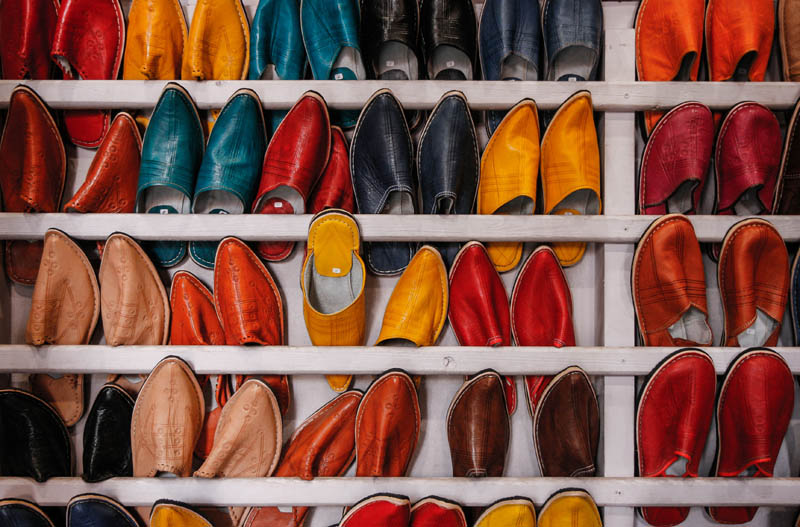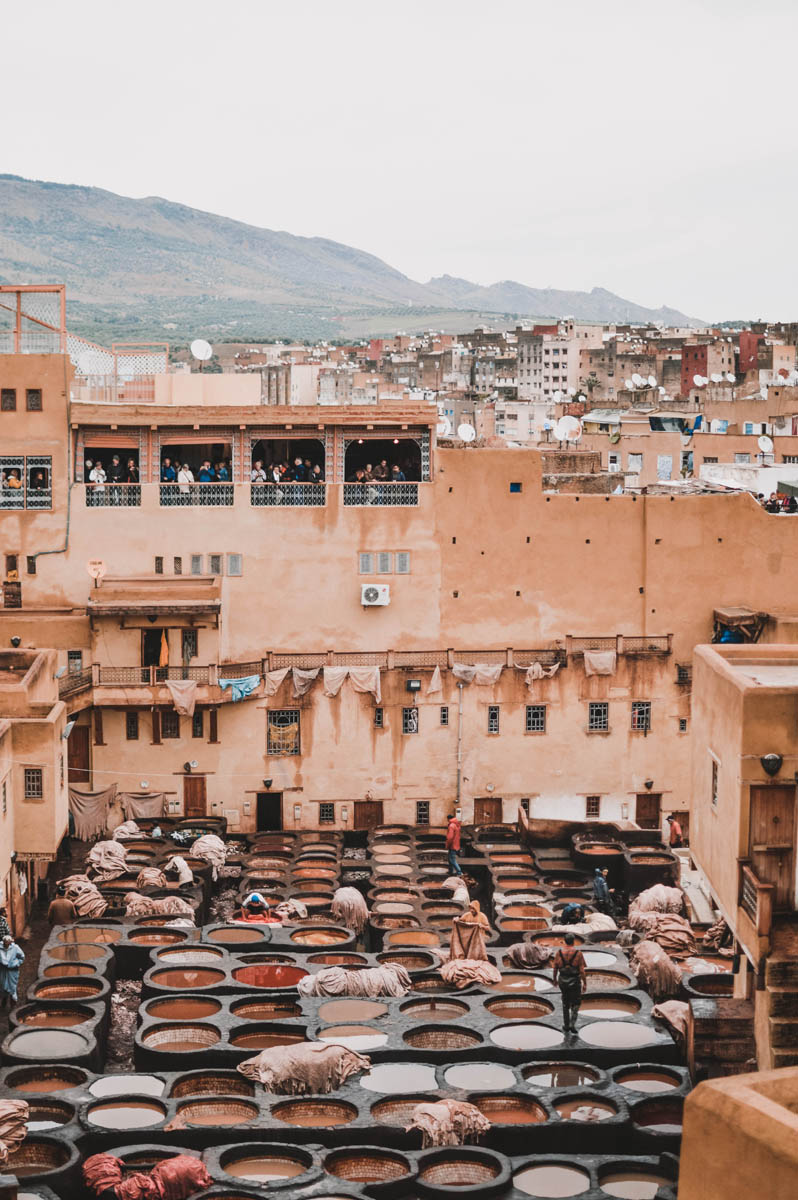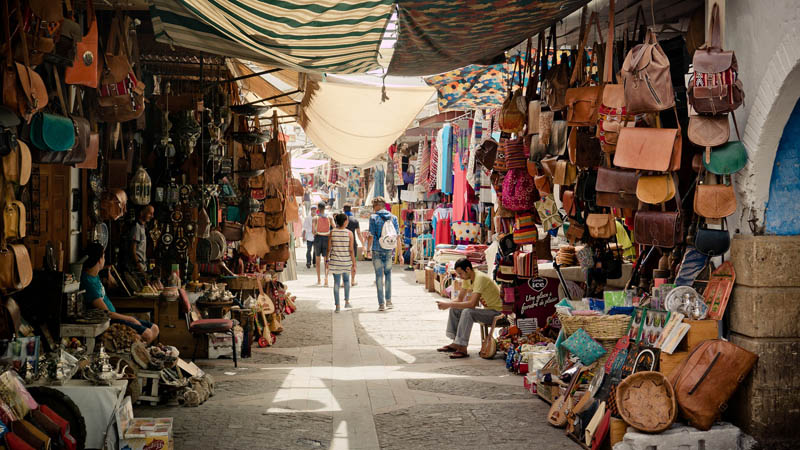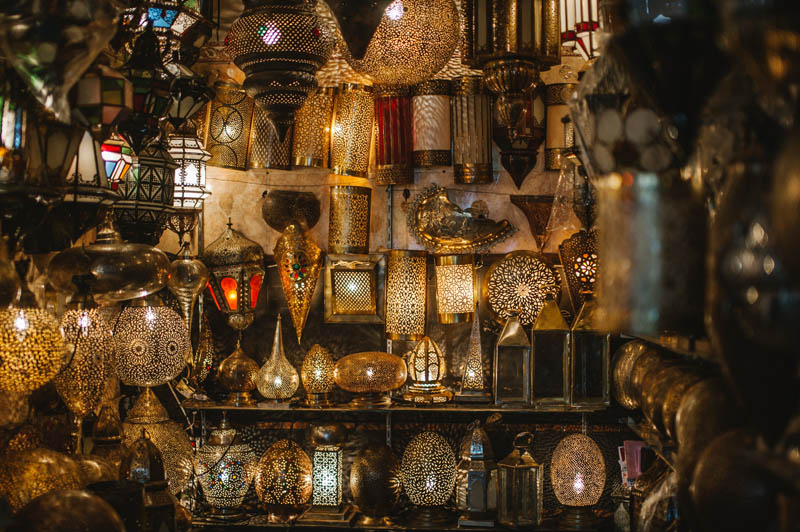(© Aussies In Morocco Tours™)
There’s no doubt about it – Morocco is a shopping mecca. From colourful rugs and woollen throws to hand-painted ceramics, statement silver jewellery inlaid with turquoise and amber and hand-dyed and stitched leather goods, it’s safe to say that if you brought a spare empty suitcase with you that you’d have no trouble filling it to bursting point!

These shoes are called Babouches. The Australian Department of Agriculture informs us that leather goods, hides, furs and skins that have been effectively and fully tanned are allowed into Australia. This includes items such as animal skin (leather) purses, shoes, wallets and belts.
Bargaining for beginners
If you haven’t visited a country where bargaining is acceptable, and indeed part of the culture, it may feel a little odd at first to negotiate on price. Here are some things to keep in mind when venturing out on your first trip in a Moroccan “souk” or marketplace.
- Bargaining or negotiating is normal (and all part of the Moroccan vendor/customer relationship) in most places selling traditional Moroccan wares. This includes rug, leather good and traditional handicrafts shops or stalls, as well as those selling spices and perfumes.
- Take your time. When you ask how much something is, and the vendor responds with a price, take a moment to calculate the price back to your native currency, think about your budget, and have another look and feel of the product.
- Start at one-third (or just over) of the initial asking price. If you end up paying 50 per cent you’ve got yourself a bargain, but try not to exceed 70 per cent of the initial asking price.

The tanneries in Fez are on UNESCO’s world heritage list. Some words of warning: they are not for the faint hearted. There is a slaughterhouse nearby and visitors are given sprigs of mint to obscure the awful smell.
- Shop with friends. If you’re shopping with someone, combining your purchase can be a great negotiating technique, and can sometimes get you a “special price for two”.
- If you’re happy, that’s the main thing! It’s important to remember that if you love what you bought, it doesn’t really matter how much or how little you bargained for it. It would likely cost a lot more back home, so try to ignore any negative Nellies who might try and tell you that you could have got it for a better price.
- Always be polite. For most Moroccan shop owners or vendors, this shop is their family’s livelihood. Treat every interaction with respect, shake hands when you say goodbye, and if they invite you to sit and have a chat over mint tea, say yes (when in Morocco…).
- For smaller-value items with an asking price of 100 dirhams or less, it’s best not to bother with bargaining, out of respect to them, and to save you time and fuss.

In some medinas the vibe is a lot less pushy than others. Marrakech for example is very pushy. Whereas Essaouira, the old Portuguese port city, is so beachy-relaxed and arty; the difference is striking.
When bargaining is a no-no
Keep in mind that bargaining does not apply to some places in Morocco. These include:
- Corner/convenience stores
- Pharmacies
- Supermarkets
- Restaurants or cafes
- Museums or cultural institutions
Basically, anywhere where prices are visible on labels, that sells everyday household items, or is housed in an official building or tourist site it is inappropriate to try bargaining.
To read more about tipping, bargaining and commissions in Morocco, read our blog post here.
Destination tips
Marrakech
When it comes to shopping, everything under the sun can be found in Marrakech, so it’s almost impossible to recommend what to buy here! However, when you do venture out into the souk, it’s good to keep in mind that it will be harder to get a bargain at the shops facing out onto the main square, Djma el Fna, as they enjoy a much higher rate of tourist foot traffic thanks to their convenient location. For this reason, we recommend going deeper into the souk, where you’ll find the quieter stores. You’ll have a more relaxed experience there, and the shopkeepers will be more willing to negotiate on price with you. Coming up we will publish a blog post showcasing some honest and skilled artisans in the Marrakech medina with whom you might like to do business. (No financial benefit to Aussies In Morocco Tours™ arising from these recommendations by the way).
Fez
As the Fez medina can be tricky to navigate solo, it’s worth engaging a guide to help show you around the city’s oldest district and shopping heart, Fes el-Bali.
What’s really special about shopping here is that the shops are all fronts for thriving workshops, dating back centuries, with each street focused on a particular trade. The crack of hammers, ping of metal and whir of weaving looms fill the air as you wander through this artisanal district, where you can find the best in handcrafted Moroccan wares, from woodwork to leatherwork, mosaic tiling, brass and copperware, jewellery, woven silks and more.
To see which of our tours visit Marrakech and Fez please start by looking here.
.

Lighting in Morocco tends to be more starlight than neon light in its intensity. Be prepared thus for ambient lighting in your accommodation rather than lighting by which you can actually clearly read your itinerary for the next day!
Essaouira
The sight of goats in trees along the road to Essaouira means that you’re in argan oil territory – these nimble goats play an important role in the traditional production of this valuable cosmetic and culinary product. Quality argan oil can be purchased from female-run cooperatives along the road to Essaouira (your guide or driver will be happy to make a short stop).
Once you reach Essaouira, it’s an ideal place to enjoy shopping – minus the stress. Compared to larger Moroccan cities, it’s relatively quiet and relaxed, which means you can enjoy a casual stroll and browse without the pressure to purchase or being bothered by competing vendors. While the selection of shops isn’t as vast as Marrakech or Fez, you’ll still find a good range of traditional Moroccan goods on offer.
You will also come across quirky pieces of art for sale like, for example, paper-maché, fantastic, deep-sea creatures made by local fishermen, or giant animals composed entirely of metal spoons. Many artists ply their exotic (and not so exotic) pieces for sale on the Ramparts of the town. If you are being shown around by a local guide and you are interested, you can ask him to take you there.
For those who book with Ausssies In Morocco Tours™ we also provide a digital booklet about Essaouria written by an English expatriate who spent many years living there that includes suggestions for good places to shop.
En Route to the Sahara
M’Goun Valley, or the Valley of the Roses has many roadside stores (they all have identical products) selling sweet-smelling rose beauty, body and household products. Rose water (sold in small plastic bottles with pink lids) makes a lovely gift for friends, and can be used as make-up remover or toner.
Please note however that there are a lot of artificial rose products for sale in Morocco including, apparently, in the Valley of the Roses. Our investigations for our perfume tour revealed that genuine rose oil is extremely expensive as it takes an enormous amount of rose petals to make only a few millilitres of oil and that the French perfume houses buy the bulk of Morocco’s supply of it, each year. One indication of artificiality is that if a rose product is coloured pink it is unlikely to be pure.
If you’re in Morocco from April to May you might want to see if you can catch the Festival des Roses festivities, as locals celebrate rose harvesting season. You will find some videos on YouTube recording it. To be frank, there are mixed reviews about whether the festival is worth attending, but it is only during festival time in May that it is possible to visit the rose farms and possibly see rose oil production in action there. Perhaps buying at the source is the best chance you will have to get the genuine product whilst in the area.
Also it may be possible to buy rose products bearing the ECO CERT insignia and perhaps a reference also to ISO 3166-2:MA-BIO154, as a mark of organic authenticity. These are probably more likely to be available for purchase in the cities than in the villages on the way down to the desert. Ask us at Aussies In Morocco Tours™ if you would like more information about the precise brands to look out for, once you have booked with us.
As your driver winds his way through the spectacular Atlas Mountains, you will notice shops on the side of the road or in small villages along the way. If you’re interested in fossils or minerals, now’s the time to take a pit stop, as the area is rich in these natural artefacts. Again, you might want to make sure that you are being sold the genuine article and not for example rocks dyed a particular colour to look pretty.
The capital of fossils is in fact Erfoud, about one hour away by car from the desert dunes. There is a museum there selling genuine fossil products too, for example bowls that have fossils embedded into them.
Traditional Berber rugs and throws are also a good idea to invest in if anything catches your eye – they can be much more affordable here than in the major cities (as it’s the local Berbers who make them, after all). If you want to buy from a genuine cooperative that directly benefits the women who make the carpets, again ask us at Aussies In Morocco Tours™ about this once you have booked with us. There is one such cooperative close to Ouarzazate that won’t take you away from your route; they just need us to pre-warn them of the approximate time of your arrival so that someone will be there to greet you. Carpet designs do vary between regions too; something to keep in mind. We can also give you some advice about this too, Cara our principal having researched the different carpet designs found in the different parts of Morocco.
If you have any other questions about the shopping experience in Morocco, contact us at Aussies in Morocco Tours™. Maybe there’s an aspect of shopping we’ve overlooked here, or you are particularly interested in acquiring specific types of products from this region and would appreciate some advice.
Refreshed and updated November 2020
